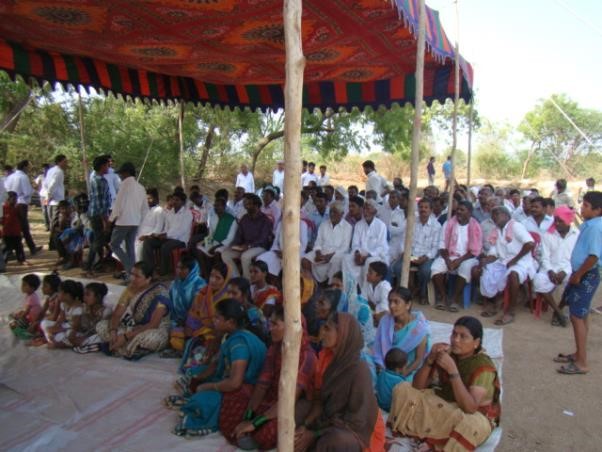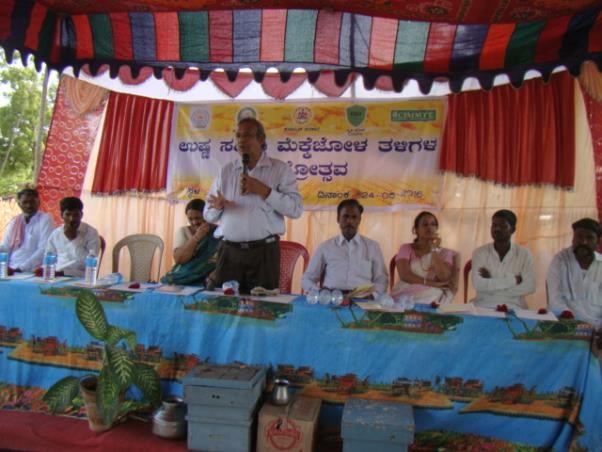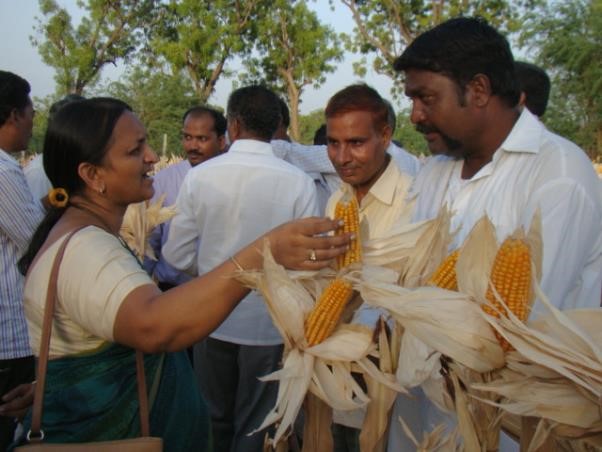
KARNATAKA, India (CIMMYT) — Maize has emerged as a preferred choice for farmers in Karnataka, India, as it can be grown with less than a third amount of water needed for traditionally planted rice and has the potential to maintain farm profitability at par or better.
However, maize is prone to heat stress during its reproductive phase in spring, as temperatures peak in March and April. Because of this and the fact maize is a fully-irrigated crop, water availability is a challenge during this dry period.
Water-efficient and heat-tolerant maize hybrids are a great way for farmers in Karnataka to farm sustainably and maintain their livelihoods during this season. To put these varieties in the hands of farmers, the University of Agricultural Sciences (UAS) in Raichur, India joined the collaborative research project Heat Tolerant Maize for Asia (HTMA).
After three years, the first generation of heat-tolerant hybrids were developed, and suitable hybrids for Karnataka farmers were identified by UAS, Raichur. CIMMYT licenced the selected hybrids to the university for deployment and scale-out in 2015.

In order to get farmer input and feedback on these heat-tolerant hybrids, a field day was organized in Karnataka in collaboration with the Government of Karnataka’s Department of Agriculture.
The field day was attended by over 100 farmers, including both women and men, as well as participants from local seed companies, state agriculture department officials and officials from UAS, Raichur.
Director of Education and Former Vice-Chancellor of University of Agricultural Sciences (UAS), Raichur B.V. Patil inaugurated the event urging farmers to diversify rice-rice systems into more sustainable and profitable rice-maize systems, which is possible with the availability of heat-resilient maize hybrids. He elaborated that UAS, Raichur in collaboration with CIMMYT-Asia, Hyderabad have developed new heat-resilient maize hybrids with wide adaptability and are suitable for cultivation in this region.

Joint Director of Agriculture Chetana Patil also advised the farmers about other benefits of adopting rice-maize systems, such as- improved soil health, reducing weed seed back etc. apart from water saving and improved farm economy. V.N. Kulkarni, Vice President of research and development at J.K. Agri-Genteics Ltd., Hyderabad participated in the field day along with his maize research team and selected promising hybrids for deployment. S.N. Vasudevan, Head of the Agri-business incubation centre also visited the demonstration site along with his staff to assess the potential of the heat stress resilient maize hybrids under heat stress conditions. Other two seed companies, Mahindra Agri Solutions Ltd, Hyderabad and Mahyco Seeds Ltd, Jalna, Maharastra have expressed their interest in new heat stress resilient hybrids and wanted to take-up these hybrids for large scale testing followed by marketing in stress-prone ecologies.
Also attending the field day were Principal Investigator of HTMA Prakash Kuchanur; S.N. Vasudevan, Head of the Agri-business incubation center at UAS, Raichur; and Mahindra Agri Solutions Ltd., Hyderabad and Mahyco Seeds Ltd., two seed companies who showed interest in purchasing the hybrids for large-scale testing and marketing in stress-prone ecologies.
Lead by CIMMYT and supported by USAID, the Heat Tolerant Maize for Asia project (HTMA) aims at improving income and food security of smallholder maize farmers living in climate-vulnerable regions through accelerated development and deployment of heat-resilient maize hybrids.
 Capacity development
Capacity development